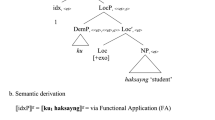Abstract
An introductory Old English grammar says that ne is a negative adverb when it precedes a finite verb but a conjunction when it occurs elsewhere. The negative adverb na generally precedes an element other than a verb. In this paper I pick out Old English glosses which correspond to the 'Latin negative + verb' construction in the thirteen Psalter versions (PsG1A to M) and try to show how often the Regius Psalter (PsG1D) uses the 'na + (Pron +) V' construction in contrast with the preference for the '(Pron +) ne + V' construction found in the Vespasian Pssalter (PsG1A) and even in the D-type Stowe Psalter (PsG1F) and Vitellius Psalter (PsG1G). My investigation will show not only the peculiarity of PsG1D but the morphological confusion of na and ne – which reflects the phonological indistinctness and leads to structural variety – in late West Saxon Psalter glosses.
Similar content being viewed by others
Author information
Authors and Affiliations
Rights and permissions
About this article
Cite this article
Ogyra, M. On the Use of Negative Na and Ne in The Regius Psalter. Neophilologus 83, 133–143 (1999). https://doi.org/10.1023/A:1004383729480
Issue Date:
DOI: https://doi.org/10.1023/A:1004383729480



